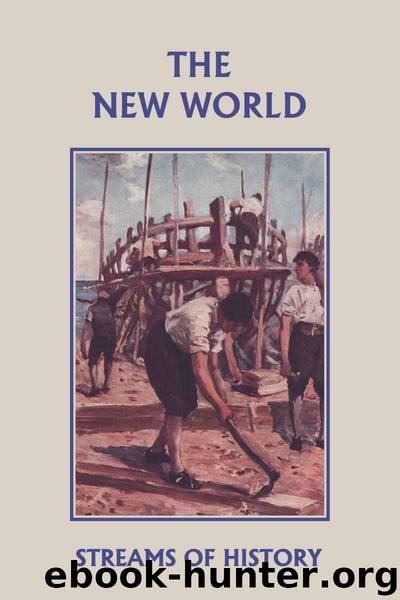Streams of History: The New World (Yesterday's Classics) by Kemp Ellwood W

Author:Kemp, Ellwood W. [Kemp, Ellwood W.]
Language: eng
Format: epub
Tags: Juvenile Fiction
ISBN: 9781599152592
Publisher: Yesterday's Classics
Published: 2010-11-10T14:53:09.579000+00:00
The Ideas Which the English Colonies Developed in America
AS we have gone forward in our history work from one era to another, we have, no doubt, come to see and feel, to some degree, that great movements in history and in the lives of peoples are more or less closely related that they do not begin suddenly, without cause, and end by chance, but that every great historical event is a result of what has gone before and affects what comes after. So at present let us look backward on the long warp and woof of history the loom of civilization has been weaving, gather up some of the threads already spun, and follow them forward as they are woven into our own American life.
In the Crusades we saw that the Europeans had their thoughts greatly widened, and learned much about traveling by water and how to build better ships. This led to extensive trade routes to the East, and afterward to Columbus's epoch-making trips to the West. During the century in which Columbus was born, by the Renaissance movement, we saw the European scholar enthusiastically take up the art and literature of Greece and Rome, and begin to think for and depend upon himself. Partly as a result of this, many people of Europe began to demand greater individual freedom in religion; and this in turn led to the Reformation. Along with these movements toward freer life, we followed also the growth of the English Parliament, and saw how, in England more than in any other European state, the people held on to their ancient Teutonic rights and worked out a system of free government. These germs of Teutonic liberty we saw were very old, being born many centuries before in the German forests.
When Europe's trade routes to the East were destroyed by the Turks, during the fifteenth and sixteenth centuries, the steps already taken in travel and learning, during the Crusades and the Renaissance, led the better scholars to say: "The earth is not flat, but round; we are now able to build large, strong ships, and know much more than formerly about water travel. Let us sail west across the Atlantic Ocean, and reach the East by an all-water route." This was the thought of Columbus, whose home was Genoa, in Italy. Now, you will remember that Genoa was one of the Mediterranean cities which grew so rapidly in trade and travel during, and just after, the Crusades, and also that the Renaissance centered in Italy. So it is not strange to see that Columbus was one of the first to believe that the earth is round, and the first to act upon the thought, by boldly setting forth westward in order to reach the eastern coast of Asia. In 1492, as we have seen in studying the Spanish colonies, he crossed the Atlantic in Spanish ships, seeking a trade route to the East. This, however, was not his only purpose. He wished to Christianize the peoples
Download
This site does not store any files on its server. We only index and link to content provided by other sites. Please contact the content providers to delete copyright contents if any and email us, we'll remove relevant links or contents immediately.
The Rise and Fall of Senator Joe McCarthy by James Cross Giblin(5280)
Paper Towns by Green John(5191)
The Giant and How He Humbugged America by Jim Murphy(3448)
The Science Book (Big Ideas Simply Explained) by DK(3286)
Eleanor & Park by Rainbow Rowell(3173)
The President Has Been Shot!": The Assassination of John F. Kennedy by Swanson James L(3101)
The Rape Of Nanking by Iris Chang(2824)
Merriam-Webster's Collegiate Thesaurus, Second Edition by Merriam-Webster Inc(2759)
Harry Potter and the Deathly Hallows (7) by J.K. Rowling(2724)
Ancient Worlds by Michael Scott(2688)
Beautiful Oblivion by Jamie McGuire(2607)
Eligible by Curtis Sittenfeld(2585)
Dork Diaries 12 by Rachel Renée Russell(2366)
Sharp Objects by Gillian Flynn(2303)
The Unlikely Pilgrimage of Harold Fry by Rachel Joyce(2273)
Frankly, Frannie by AJ Stern(2209)
The Astronomy Book by DK(2157)
Forensics by Val McDermid(2092)
Who Was Louis Braille? by Margaret Frith(1981)
